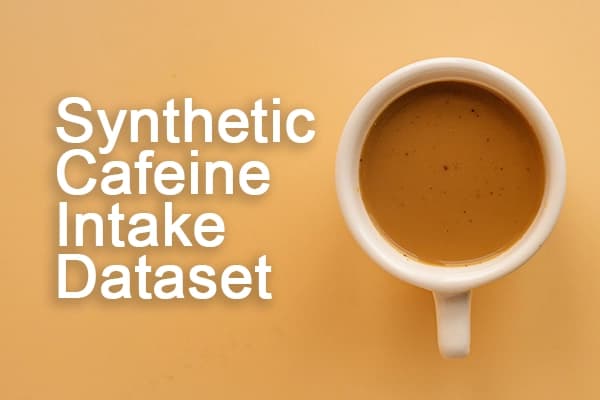Synthetic Caffeine Intake Tracker Dataset
Patient Health Records & Digital Health
Tags and Keywords
Trusted By




"No reviews yet"
£79.99
About
The Synthetic Caffeine Intake Tracker Dataset is a fully anonymised, large-scale synthetic dataset designed for research, health analytics, and educational applications. It captures detailed information on caffeine consumption, individual demographics, behavioural effects, and lifestyle patterns.
Dataset Features
- caffeine_mg: Total caffeine consumed by an individual per day (in milligrams).
- age: Age of the individual (in years).
- focus_level: Self-reported focus level on a standardised scale (e.g., 1 to 10).
- sleep_quality: Self-reported sleep quality score (e.g., 1 to 10).
- sleep_impacted: Whether caffeine negatively impacted sleep (Yes/No).
- beverage_coffee: Indicates whether coffee was consumed (True/False).
- beverage_energy_drink: Indicates whether energy drinks were consumed (True/False).
- beverage_tea: Indicates whether tea was consumed (True/False).
- time_of_day_morning: Caffeine consumed during morning hours (True/False).
- time_of_day_afternoon: Caffeine consumed during afternoon hours (True/False).
- time_of_day_evening: Caffeine consumed during evening hours (True/False).
- gender_female: Gender indicator for female (True/False).
- gender_male: Gender indicator for male (True/False).
Distribution

Usage
This dataset can be used for:
- Health Research: Analyse how caffeine affects focus, sleep, and other lifestyle factors.
- Behavioral Modeling: Predict individual outcomes like sleep disruption or productivity based on caffeine intake patterns.
- Consumer Insights: Understand beverage preferences by demographics and time of day.
- Educational Use: Provide a rich dataset for learning regression analysis, classification, and data visualisation in health and behavioural sciences.
Coverage
All data are synthetically generated and anonymised, preserving realistic behavioural patterns while ensuring full privacy. This makes it ideal for experimentation and educational deployment without ethical concerns.
License
CC0 (Public Domain)
Who Can Use It
- Health Researchers and Dietitians: To study caffeine intake trends and effects.
- Data Scientists and Analysts: For developing behavioral prediction models and insights.
- Educators and Students: As a realistic dataset for projects in health data science, behavioural analysis, and machine learning.
Loading...
£79.99
Download Dataset in CSV Format
Recommended Datasets
Loading recommendations...
